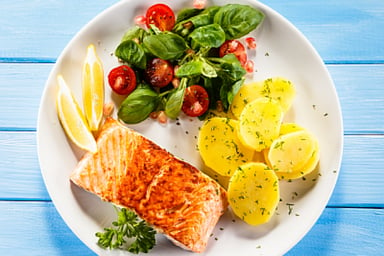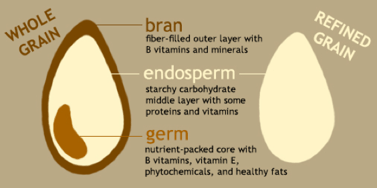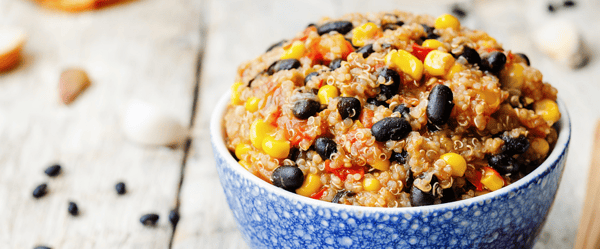Do you think fat is the enemy? Did you grow up thinking all fats = BAD?
SPOILER ALERT: Fats themselves do not make you fat & we need fat in our diet
Fat is a macronutrient that our body needs for energy and absorption of vitamins. However, not all dietary fat is created equal. Therefore, when it comes to dietary fat, what matters most is the type of fat you eat. Rather than choosing a ‘low-fat’ diet, it is important to focus on eating beneficial “good” fats and avoiding harmful “bad” fats.
CHOOSE foods with “good” unsaturated fats… 
Diets containing unsaturated fats (monounsaturated and polyunsaturated) are associated with lower disease risk such as heart disease, type II diabetes, and certain cancers. Omega-3’s and Omega-6’s are examples of polyunsaturated fats, and they may help prevent heart disease while offering other health benefits. They are considered essential fatty acids because our body cannot produce them on its own.
Where do you find these?
Cooking oils made from olives, sunflowers, safflowers, peanuts — the monosaturated fats.
Fatty fish such as salmon, mackerel, and sardines, as well as flaxseeds, walnuts, canola oil, and soybean oil – polyunsaturated fats
AVOID “bad” trans-fat…
Even when eaten in small quantities, trans-fat will increase disease risk. These fats are most often artificially produced for their texture and “mouth feel,” and they usually appear on ingredient lists as partially hydrogenated oils.
LIMIT foods high in saturated fat…
While saturated fats are not as damaging as trans-fat, by comparison to unsaturated fats they are more harmful. Saturated fats lower ‘good’ (HDL) cholesterol levels. An easy way to categorize these fats, are the solid form at room temperature (see examples listed below by the USDA).
Some common foods containing saturated fat:
| beef fat (tallow, suet) | butter | chicken fat |
| coconut oil | cream | hydrogenated oils |
| milk fat | palm and palm kernel oils | partially hydrogenated oils |
| pork fat (lard) | shortening | stick margarine |
FAT = FAT?
Fat is a critical component to our diet; however consume fat in moderation. It is important to remember that all fat (unsaturated, saturated and trans-fat) have calories, and excess calorie intake per body calorie needs will cause weight gain. A balanced diet will lend itself to more unsaturated fats and fewer saturated fats. Choose whole grains, legumes, nuts and seeds, fresh fruits and vegetables, low-fat dairy, and a variety of lean and plant-based proteins, and you should be in good shape!
